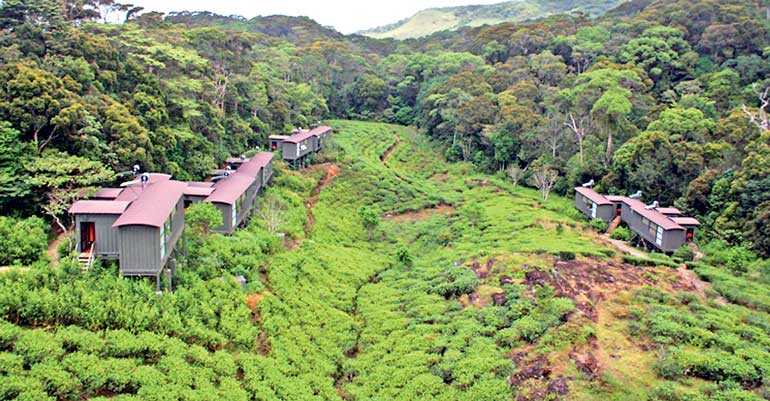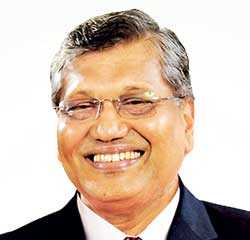Tuesday Mar 03, 2026
Tuesday Mar 03, 2026
Tuesday, 10 April 2018 00:00 - - {{hitsCtrl.values.hits}}

By Shannon Jayawardena
Being an expert in sustainable tourism and a key figure in the eco-tourism field, Sustainable Tourism Consultant and Sri Lanka Rainforest Ecolodge Chairman Prema Cooray stated that Sri Lankan eco-tourism has a massive untapped potential at an interview with Daily FT.
Cooray spoke on the topics; sustainability and eco-tourism while highlighting its growth and challenges throughout the years. He also stressed on the fact that the two are very much linked together and must be taken care of for the success of both sectors.
He also noted that nature tourism is very important for Sri Lanka. The country has an abundance of natural resources, flora and fauna. Likewise there’s whale watching, elephant watching, bird watching and leopard watching which, are a huge part of eco-tourism.
Birth of eco-tourism in the country
“Eco-tourism has a lot to do specifically with tourism and sustainability. I am the one who led the development of the Kandalama Hotel and I’m just trying to finish a book on it which has taken me nearly seven years. Kandalama in 1994 when we started was a project that started at the back of the war and no one attempted to start a big hotel after the riots. We were then going downhill with our tourist arrivals reducing to 198,000 throughout the year. Now we get around 232,000 per month.”
Cooray was at the time leading the hotels of Aitken Spence which was known to be at the top. The company then took a decision to make a major development in the cultural triangle because the cultural presence in terms of a hotel was not very prominent back then, he stated.
He added that Kandalama is possibly the project that created the biggest sensation in the protest world as many protested about the hotel. It nearly led to the collapse of the Government as the issue was that serious. It was the late President Premadasa that gave leadership to the project when allegations were made that Kandalama was an environmental disaster.
“These things are not necessarily due to genuine reasons but were all tainted with all sorts of backlash. Kandalama was in a very sensitive location which is what we call a catchment area and people said that building a hotel in such a place would cause impediment to the natural water in the tanks and would harm the social fabric of the rural community. Those were the two basic allegations made against us. It reached almost an epidemic in Colombo.”
However after a tough battle, Kandalama was built upon their own risk and today it is one of the most exceptional hotel experiences, going on to make a profit of Rs. 500 million this year. The hotel has since won many awards in terms of engineering, architecture, community and social development, including the first green hotel in Asia.
Cooray stated that the controversies however created awareness about how you should care about the environment, about water and so forth. That’s the time eco-tourism or eco-friendly tourism really set up in Sri Lanka. It was a learning process for the national environment body. Hence that was the birth of eco-tourism in the country.
Relevance to sustainability
“When you talk of nature, it involves eco-tourism. Eco-tourism is about having a destination with a rich profile and nature. Then you have the chance to project yourself as an eco-tourism destination. Even today Sri Lanka comes right on top in terms of bio-diversity in Asia. We have an abundance of water and we could even be a country that other countries import water from in the years to come if preserve the environment. If you don’t look after your bio-diversity, the eco-systems will fail. When you want rain you get rain, so it truly is a spectacular country,” said Cooray.
Cooray added that tourism in general is a large consumer of resources. When you take the tourism industry it uses a fair amount of water and a lot of energy. This has a huge impact on sustainability. Water and energy must be used but it should be used carefully and sustainably. Since it is a large consumer of resources, tourism plays a major part in recognising this aspect and trying to control where it’s possible. Less optimal utilisation of resources is very important.
“In simple words sustainability is about creating a better future for your next generation. Sri Lanka is still fortunate as it retains roughly around 30% of the forest cover. So tourism is so crucial for the optimal usage of resources because we are a larger consumer. Sustainability comes through that, you sustain your activities in a way that it will not harm the future generations.”
Optimal utilisation of resources
Cooray lives with the philosophy that forests are our lives and it is where all the eco-systems prevail to give us clean air, good water and a healthy living. If you destroy the forest, all of that is lost. If you do so, you destroy the vegetation and the species who play an important role in the whole manifestation of an eco-system which gives you the chance to live.
“So when you destroy that, you destroy the very environment that is necessary for you to survive. Another aspect is that we have to protect our forests. When you fly over in a plane, Sri Lanka is seen to be filled with plantation and is so green. Tourism is so greatly involved in sustainability because of the utilisation of the resources,” he added.
There are so many threatened species even in Sri Lanka and we have to be careful and protect these animals who play a role in the lifecycle. Even some fish are threatened and we must know not to eat them. There’s around one million people in Colombo so if two million tourists come in everyday, it makes a huge impact on the resources, Cooray went on to say.
He said: “There are certain things that we can do and that we can’t do. If we overdo it, we will have development in the expense of no preservation and if there’s no preservation then there’s no life. It is our responsibility to preserve natural resources and create a sustainable eco-tourism in Sri Lanka.”